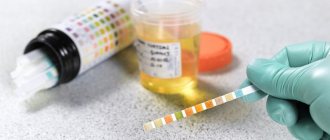If dark urine appears for a long time, a man should consult a specialist. If the release of altered urine is not accompanied by other symptoms, then perhaps the problem lies in physiological processes, food consumed or alcohol. When excreting pathologically dark urine, a deterioration in general well-being is characteristic. The reason for this phenomenon may lie in deadly diseases, which can only be determined after a thorough diagnosis. Treatment is prescribed based on the identified causes of the pathology.
Hygiene
No disease appears on its own. Each of them is the result of the wrong lifestyle that a person leads. And for treatment to be effective, in some cases it is worth giving up bad habits in the name of a speedy recovery.
Body hygiene has always been considered very important. In particular, do not forget about genital hygiene. A sedentary lifestyle, poor hygiene, and poor diet lead to the appearance of sores. Also, dark-colored urine in representatives of the stronger sex may be evidence of promiscuous sexual activity and, as a result, the acquisition of microorganisms that lead to disastrous consequences.
Principles of therapy
The treatment regimen depends on what disease caused the darkening of the urine. General principles of treatment include restoring water balance and using drugs with antibacterial effects. If dark, cloudy urine is observed in men, which is caused by liver disease, medications are prescribed to improve microcirculation within cells and normalize protein and fat metabolism. The patient may also be given ascorbic acid drips to eliminate the effects of toxins on the liver.
In severe pathologies, a liver transplant may be required. If a man has been diagnosed with kidney disease (pyelonephritis, glomerulonephritis), treatment is carried out in a hospital setting. Therapy involves taking antibacterial and immunosuppressive drugs. In case of serious illnesses, hemodialysis is prescribed.
Treatment of kidney stones is based on the use of drugs that help dissolve stones. In case of complications, surgery cannot be avoided. Diseases of the genital organs, as a rule, are infectious in nature, so the patient is prescribed drugs with an antibacterial effect. If prostate adenoma is detected, transurethral resection or adenomectomy is resorted to. Such manipulations involve the removal of excess tissue that leads to compression of the urethra.
For diseases such as cystitis and urethritis, treatment comes down to the use of antibacterial drugs and immunomodulators. In addition, antiseptic drugs can be used for injection into the urethra. If conservative treatment methods do not have a therapeutic effect, the doctor may decide to perform an epicystomy.
If the problem is in the liver
The liver is an organ in which the main processes of breakdown and processing of waste products occur. When its work is disrupted, these substances enter the bloodstream and kidneys, which are unable to process them. This entails blockage of the lumen of the bile ducts, after which bilirubin enters the kidneys, from where it penetrates into the urine.
This is what can cause dark urine in men. An identical process starts when liver tissue is damaged, which is caused by cirrhosis, tumor, and hepatitis. With this pathological condition, the patient experiences an increase in temperature, yellowing of the skin, and the color of the eye sclera changes.
Brown urine
If the dark yellow color of urine can be explained by natural causes, then a brown, brown or black tint is more often pathological. Moreover, the culprits are not only diseases of the genitourinary system, but also damage to other organs.
Black tea-colored urine is the most obvious symptom of developing liver pathology. When liver cells are damaged, a large amount of bilirubin (direct and indirect) and urobilin are released into the blood. These bile pigments give urine the color of strong black tea.
It is important to remember that dark brown or black urine most likely indicates developing hepatitis, popularly called jaundice or Botkin’s disease. In addition to the dark color of urine, there are other signs:
- Yellowing of the sclera of the eye, mucous membranes, skin.
- Discoloration of feces (up to white feces).
- Deterioration in general health: nausea, vomiting, lack of appetite, headache.
- The appearance of a feeling of heaviness and then pain in the right hypochondrium.
It must be remembered that the manifestation of symptoms can be limited only to a change in the color of urine in combination with poor health. Other signs will appear only with further progression of the disease.
In some cases, when severe dehydration develops, the urine resembles dark beer or black tea. The reasons for such severe loss of fluid are prolonged vomiting and diarrhea, poisoning with poisons/toxins, and a prolonged infectious process.
Black urine, which resembles strong black coffee, is less common, but signals very dangerous abnormalities.
In patients with diabetes, the appearance of black urine may be associated with diabetic (ketoacidotic) coma. Additional symptoms are increasing thirst, dry skin and mucous membranes, headaches, loss of appetite.
A specific symptom will be a strong aroma of acetone from the patient’s skin and breath. If appropriate measures are not taken, severe vomiting the color of coffee grounds and abdominal pain appear. Dehydration gradually increases due to dyspeptic disorders (vomiting), and poisoning of the body increases (intoxication). At this time, it is necessary to call an ambulance and take urgent measures.
Black urine often accompanies conditions that threaten the health and life of the patient:
- Oncological processes, malignant neoplasms of the urinary system, liver and biliary tract.
- Intensive breakdown of red blood cells (hemolytic disease).
- Heavy bleeding from the reproductive and/or urinary organs.
- Copper poisoning of the body.
In any case, if black urine appears, you must immediately contact a medical facility for examination.
It is also necessary to mention the pathological causes of urine turning dark yellow. Often the phenomenon is based on excessive passion for alcoholic beverages (alcoholism). Long-term “binges” can change the color not only to rich yellow, but also give a dark brown tint. In some cases, darkening of urine is caused by obstruction of the bile ducts, the development of liver failure, liver injury, chronic kidney damage (nephropathy, renal failure).
Additional symptoms
When the bladder is inflamed, dark yellow urine is accompanied by a burning sensation when urinating, pain in the lower abdomen, increased urge, and sometimes increased temperature.
Kidney damage is characterized by lower back pain of varying intensity, increased blood pressure, dry mouth, weakness, periodic fever, swelling in the face and legs.
In addition to discoloration, clots may appear. Possible reasons:
- Prostatitis. Clots appear after sexual intercourse.
- Physical overexertion. The urine darkens, blood clots appear in it due to ruptures of blood vessels - marching hematuria.
- Stones in the prostate. Characteristic is the periodic appearance of flakes and blood in the semen.
Clots can be a sign of a bleeding disorder, vasculitis, or hemophilia. Cloudy urine occurs due to pus and bacteria with inflammation of the genitourinary organs, the epithelium of the urinary tract, and excess protein with kidney damage. If turbidity is observed after sex, then the reason is retrograde ejaculation - sperm is completely or partially thrown into the bladder.
Mechanism of retrograde ejaculation
When to see a doctor
If you notice that your urine is dark, you should drink plenty of water to prevent dehydration. Remember what you ate or what medications you took. If there was nothing suspicious, then we need to look for the reason. For example, if your urine is dark brown and you notice yellowing of your skin and eyes, this could be a sign of a liver problem. During your appointment, the doctor will ask you about many things: nutrition, exercise, past illnesses, suspicious symptoms, etc. It is necessary to take a urine test (in the morning) and an STD test. If necessary, a biochemical blood test is prescribed. Treatment is prescribed individually only after determining the cause of the change. Brown urine in a man is a symptom of the disease, and not an independent disease.
Prevention
How to avoid dark urine:
- Drink clean water when thirsty or herbal teas.
- Do not be exposed to excessive physical activity, so as not to provoke damage to the renal tubules and glomeruli by increased pressure.
- Do not abuse alcohol, carbonated drinks with dyes, or coffee.
- If swelling, discomfort in the lumbar region, pain in the right hypochondrium, groin or lower abdomen occurs, you should consult a doctor.
There is no need to give up coloring healthy products; urine pigmentation in this case does not affect health. To make sure that the reason is in nutrition, it is enough to give up coloring foods for a couple of days.











